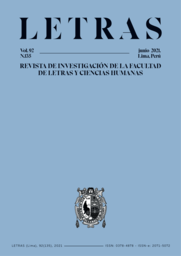The Study of Identity Related with Evolutionary Revolution in the Writings by Manuel González Prada
Abstract
The formation of the identity of collectives is essential for the understanding of their history. Manuel González Prada is one of the most important authors in the definition of Peruvian identity. He denounced the identity composed of prejudices, atavistic fears and submission to the authority inherited from Spanish rule and worked to build a social identity based on science, rebellion and freedom. In this paper, we study the construction of identity made by the author from the narrative model of Paul Ricoeur and the change of the cultural logic defined by Jean Pierre Olivier de Sardan. For this purpose, the following texts are analyzed:Páginas libres (1894), Horas de lucha (1908), Bajo el oprobio (1933) and Anarquía (1946). In these works, Manuel González Prada criticizes the identity of domination that prevailed in Peruvian society, whereby one group imposes itself on another group, which responds with humility and resignation. Therefore, he urges a change in the collective identity, characterized by a critical sense, that is, he promotes a social attitude of pride and rebellion against the abuses of power. Thus, the revolution proposed by Manuel González Prada would lead to a change in the Ricoeurian ipseidad and to the rupture of a cultural logic of corruption.Downloads
Métricas alternativas
References
Acosta, Y. (2017). Matar al padre. Barcelona: Alrevés.
Albizúrez Gil, M. (2016). Modernidades extremas. Textos y prácticas literarias en América Latina. Francisco Bilbao, Manuel González Prada, Manuel Ugarte y Manoel Bomfim. Madrid: Iberoamericana.
Bretoneche Gutiérrez, L. A. (2008). La concepción del hombre en el pensamiento de Manuel González Prada. (Tesis doctoral). Universidad Nacional Mayor de San Marcos, Lima, Perú.
García Márquez, G. (2004). Por la libre. Obra periodística (1974-1995). Barcelona: RBA.
González Prada, M. (1933). Bajo el oprobio. París: Tipografía de Louis Bellenand.
González Prada, M. (1940). Anarquía. Santiago de Chile: Ercilla S. A.
González Prada, M. (1976). Páginas libres. Horas de lucha. Venezuela: Biblioteca Ayacucho.
Larson, B. (2004). Trials of Nation Making. Liberalism, Race and Ethnicity in the Andes, 1810-1910. Cambridge: Cambridge University Press.
Martínez Riaza, A. (1994). El Perú y España durante el oncenio. El hispanismo en el discurso oficial y en las manifestaciones simbólicas. Histórica, 18 (2), 335-363.
Martínez Riaza, A. (2015). El peso de la ley: la política hacia los españoles en la independencia del Perú (1820-1826). Procesos: revista ecuatoriana de historia, 42, 65-97. https://doi.org/10.29078/rp.v1i42.569
Ortega, J. (1988). Crítica de la identidad: la pregunta por el Perú en su literatura. Ciudad de México: Fondo de Cultura Económica.
Pereyra Plasencia, H. (2009). Manuel González Prada y el radicalismo peruano. Lima: Academia Diplomática del Perú.
Ricoeur, P. (1996). Sí mismo como otro. Madrid: Siglo Veintiuno Editores.
Roca Sierra, M. (2003). La construcción del sujeto en la narrativa española actual. Madrid: Fundación Universitaria Española.
Sevilla-Vallejo, S. (2019). La lectura viva. Criterios psicológicos y didácticos y para fomentar el descubrimiento en los textos. En M. I. de Vicente-Yagüe y E. Jiménez Pérez (Eds.), Investigación e innovación en educación literaria (pp. 241-250). Madrid: Síntesis.
Sevilla-Vallejo, S. (2020). La construcción de la identidad personal y nacional en los Comentarios reales del Inca Garcilaso de la Vega. En S. Fernández Moreno, P. Mármol Ávila y Y. Pereira Melo (Coords.), Aproximaciones al nacionalismo en las literaturas hispánicas (pp. 207-238). Madrid: Universidad Autónoma de Madrid.
Tauzin-Castellanos, I. (1998). La vida literaria limeña y el papel de Manuel González Prada. En Universidad de Lima (Ed.). I Encuentro Internacional de Peruanistas. Estado de los estudios histórico-sociales sobre el Perú a fines del siglo XX (pp. 513-526). Lima: Universidad de Lima, Fondo de Cultura Económica, Unesco.
Tauzin-Castellanos, I. (2004). Escrituras y poderes: Manuel González Prada y el poder político (1912-1918). Escritura y Pensamiento, 7 (15), 37-63.
Tauzin-Castellanos, I. (2005). Manuel González Prada, acteur de la vie politique à l’aube du XXe siècle. Actes du 1er Congrès du GIS Amérique latine: Discours et pratiques de pouvoir en Amérique latine, de la période précolombienne à nos jours. Université de La Rochelle, 1-12. https://halshs.archives-ouvertes.fr/halshs-00005640/document
Tavits, M. (2005). Causes of Corruption: Testing Competing Hypotheses. Oxford: Nuffield College, Oxford University. https://www.nuffield.ox.ac.uk/politics/papers/2005/Tavits%20Nuffield%20WP.pdf
Taylor, Ch. (1992). Sources of the Self: The Making of the Modern Identity. Cambridge: Harvard University Press.
Vázquez Montalbán, M. (2004). El hombre de mi vida. Barcelona: Planeta.
Velázquez Castro, M. (2005). Las máscaras de la representación. El sujeto esclavista y las rutas del racismo en el Perú (1775-1895). Lima: Universidad Nacional Mayor de San Marcos, Banco Central de Reserva del Perú.
Ward, Th. (2001). La Anarquía inmanentista de Manuel González Prada. Lima: Horizonte.
Ward, Th. (2003). González Prada, la mente y las manos. Revista peruana de filosofía aplicada, 11, 46-54.
Ward, Th. (2004). La resistencia cultural. La nación en el ensayo de las Américas. Lima: Editorial Universitaria.
Copyright (c) 2021 Letras (Lima)

This work is licensed under a Creative Commons Attribution 4.0 International License.
Este obra está bajo una licencia de Creative Commons Reconocimiento 4.0 Internacional



















